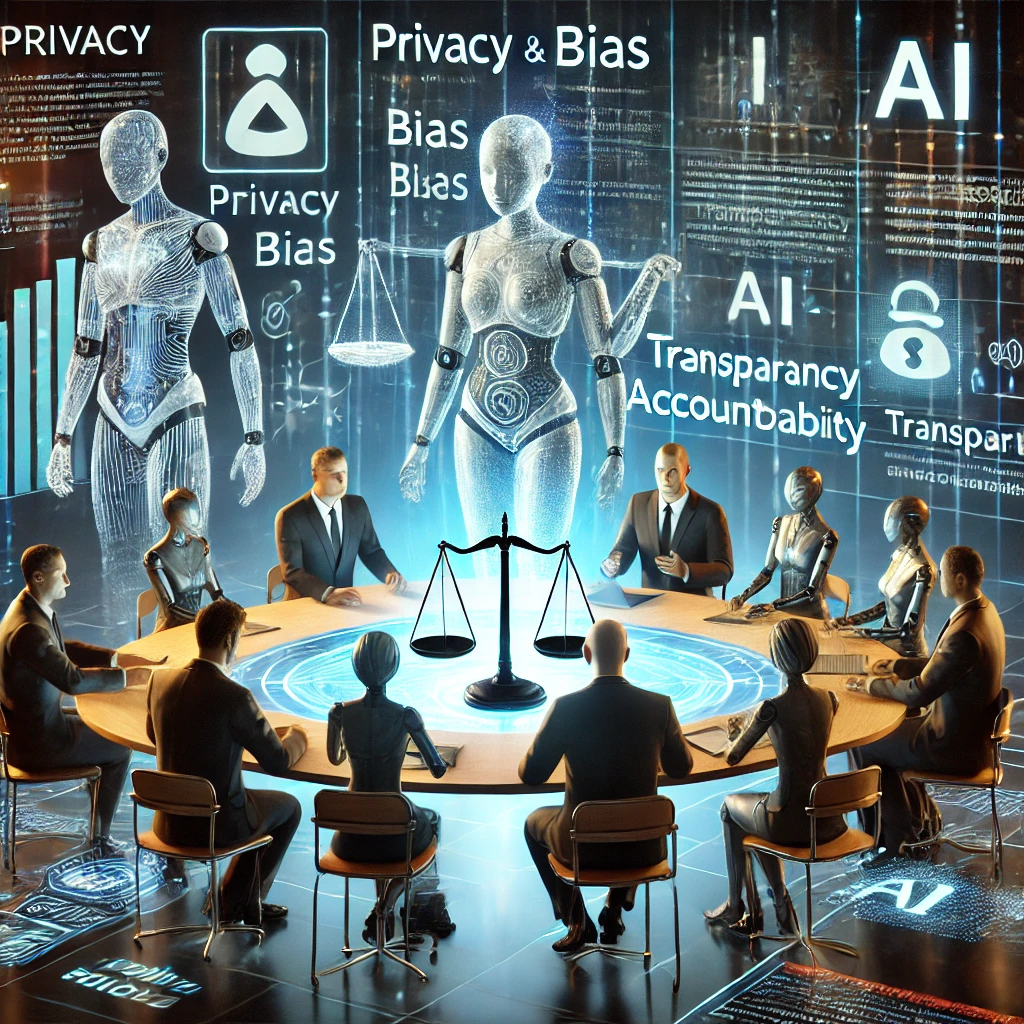Artificial Intelligence (AI) refers to machines designed to mimic human cognitive abilities, such as learning and problem-solving. AI systems use data to identify patterns and make predictions, impacting many industries. However, the rapid advancement of AI technologies has sparked significant AI Ethics and Policy discussions about its ethical implications and regulation. As AI becomes more widespread, understanding its potential consequences is essential.
The Importance of Ethical Considerations in AI
AI offers incredible benefits, but it also brings new challenges. Ethical considerations are critical to ensuring AI systems operate safely, fairly, and transparently. With AI’s growing influence, it’s essential to address questions of fairness, privacy, and accountability. These issues will shape how AI integrates into society and affect its potential to either benefit or harm individuals.
Key Ethical Issues in AI
Bias and Fairness in Algorithms
AI systems learn from data. When this data contains biases, AI can replicate and even amplify these biases. For instance, algorithms used in hiring may favor certain demographics, causing unfair outcomes. To tackle this, developers need to focus on using diverse, representative data and testing algorithms for fairness. Ensuring fairness in AI is vital to avoid perpetuating societal inequalities.
Transparency and Explainability
Many AI systems operate as “black boxes,” meaning their decision-making process is not easily understood. This opacity poses problems, especially in sensitive healthcare and law enforcement sectors. AI systems must be transparent and explainable. This means ensuring that users understand how decisions are made, building trust and allowing for accountability.
Privacy and Data Protection Concerns
AI systems require vast amounts of data, much of which is personal. This raises significant privacy concerns. How this data is collected, stored, and used must follow strict ethical standards. Data protection laws, like the GDPR, aim to secure individuals’ privacy while allowing AI to flourish. Striking the right balance between data utilization and privacy is one of the biggest challenges in AI regulation.
Global AI Ethics and Policy Frameworks
International Guidelines and Standards
AI’s rapid expansion has led to the creation of international guidelines. Organizations like the OECD and the European Union aim to set global standards for AI ethics. These standards focus on ensuring that AI is developed in a way that respects human rights, fairness, and accountability. Many countries are adopting these frameworks to regulate the AI landscape consistently.
Government Regulations on AI
Governments are playing a critical role in AI regulation. The European Union, for example, has introduced the AI Act, which classifies AI systems based on risk. Higher-risk applications, like facial recognition, face stricter controls. The United States has yet to establish comprehensive AI laws, but many states have already introduced their own regulations. Governments must continue developing policies to ensure AI is used responsibly.
Industry Best Practices
Industry leaders are also adopting best practices to regulate AI ethics. Companies like Google and Microsoft have published ethical AI guidelines. These internal guidelines focus on fairness, transparency, and privacy. They complement government regulations and contribute to the broader push for responsible AI development. Collaboration between industry and government ensures a more effective regulatory environment.
Case Studies in AI Ethics
Ethical Implications of Facial Recognition
Facial recognition technology is becoming more common in security, retail, and law enforcement. However, it raises serious ethical questions. Privacy concerns and the potential for bias in facial recognition systems have led to public outcry. In response, some cities and countries have banned the technology. These ethical implications highlight the need for clear regulations surrounding its use.
Autonomous Vehicles and Moral Dilemmas
Autonomous vehicles promise to revolutionize transportation. However, they present moral dilemmas. In unavoidable crash situations, should the vehicle prioritize the safety of its passengers or minimize harm to pedestrians? These difficult decisions raise significant ethical questions about the programming of autonomous systems. Regulations must address these moral complexities as self-driving cars become more widespread.
AI in Healthcare Decision-Making
AI has the potential to transform healthcare by assisting doctors in diagnosing diseases and suggesting treatments. However, it also raises concerns about accountability and reliability. Who is responsible if an AI makes a mistake in diagnosis? AI tools in healthcare must support human decision-making without replacing the need for human oversight. Ensuring transparency and fairness is key to AI’s success in healthcare.
Future of AI Ethics and Policy
Emerging Trends in AI Regulation
As AI continues to evolve, so does the need for new regulations. Governments and international organizations are working to create frameworks that address the emerging risks of AI. Increasingly, policymakers focus on AI’s societal impact, emphasising human rights and fairness. Emerging trends suggest that regulation will become more robust, focusing on mitigating risks like job displacement and social inequality.
The Role of Ethics in AI Development
The role of ethics in AI development will only grow. Ethical considerations must be integrated into every stage of AI design, from data collection to algorithm development. As AI systems become more autonomous, developers must ensure that ethics remain at the forefront of decision-making. This approach will help prevent harmful consequences and foster AI that benefits everyone.
International Cooperation and Standards
AI’s global impact requires international cooperation. Countries must work together to harmonize AI regulations and standards. This collaboration will ensure that AI is developed responsibly and ethically globally. Establishing international AI ethics committees and regulatory bodies will promote consistency and fairness across borders.
Updated Facts and Figures on AI Regulation
| Region | AI Ethics Policy | Year Introduced | Key Focus Areas |
|---|---|---|---|
| European Union | AI Act | 2021 | High-risk AI applications, transparency, privacy |
| United States | State-level regulations | 2023 | Bias prevention, transparency |
| China | National AI Strategy | 2022 | AI safety, ethical guidelines |
| OECD | Principles on AI | 2021 | Human rights, accountability, fairness |
| Japan | AI R&D Framework | 2022 | Innovation, safety, data protection |
Conclusion
AI ethics and policy are central to the future of technology. As AI systems become more integrated into daily life, addressing the ethical issues is crucial. Fairness, transparency, privacy, and accountability must guide AI development. Governments, industries, and international bodies must work together to create clear and effective regulations. By doing so, we can ensure AI benefits society without compromising human rights or fairness. The future of AI ethics will depend on continued collaboration, innovation, and a commitment to ethical development.

